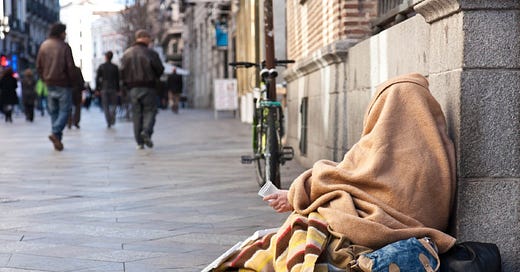While the campaign to win over Australians ‘Yes’ vote ramps-up, and October 14, rapidly nears, there’s another group of Australians equally as deserving of a voice.
Yet, they’ve been ignored and pushed aside, and that’s because there’s fewer votes to be secured from underprivileged and homeless Australians compared to the Indigenous vote, and nor is their lobby group as powerful.
Whatever the reason, Australia’s homeless and underprivileged are no different.
They face similar systemic challenges and are increasingly marginalised in a debate that should include them, but it doesn’t.
Instead, they sit by the sidelines watching Australia divide itself over an issue that should incorporate all disadvantaged groups, and they’re entitled to wonder when their voices will be heard?
But they shouldn’t be holding their breaths anytime soon, because as they’ve discovered, they simply don’t matter.
For Australia’s homeless and underprivileged, their frustrations continue to grow, and yet, the Voice to Parliament focuses exclusively on addressing the disadvantages faced by Indigenous communities but ignores their issues.
Being socially and economically disadvantaged knows no cultural boundaries, but the federal government and the PM, have created a Frankenstein that discriminates and politically weaponises a major social issue.
Non-indigenous Australian’s facing grave systemic challenges are feeling overshadowed and have been, especially when they’re told government resources are finite.
The absence of homeless and underprivileged Australians in the Voice debate is overwhelming, especially when the Australian Bureau of Statistics figures show in excess of 122,000 people were homeless in Australia as of 2021.
And the figure continues to grow at an alarming rate.
The issues contributing to their struggles—lack of affordable housing, inadequate mental health services, and employment barriers—are rarely given the same level of attention or legislative effort.
With the government demonstrating its willing to spend more than $50m to market the Voice to Parliament—similar funding is overtly absent when it comes to alleviating homelessness or addressing poverty.
The stark contrast raises questions about the government's commitment to a more inclusive form of social justice.
Australia's underprivileged communities not only lack a structured formal mechanism to voice their concerns to Parliament, unlike the proposed body for Indigenous Australians, their political appeal is non-existent.
It leaves these communities voiceless and impotent throughout Canberra.
Being socially and economically disadvantaged isn’t exclusive to any one demographic.
Homelessness and underprivileged status cut across racial and cultural lines, affecting Indigenous Australians, migrants, and people from all walks of life.
The systemic nature of these challenges calls for comprehensive solutions that extend beyond the scope of a single referendum.
The organisations that do serve Australia's homeless and underprivileged face uphill battles garnering political and public support.
And many are constrained by tight budgets with a heavy reliance on community donations without the luxury of government-backed, multi-million-dollar campaigns to amplify their concerns and propose constitutional amendments.
The Voice to Parliament debate raises more broader moral and ethical questions about what and who society values and the overt discrimination it exhibits for political gain and expediency.
If the federal government is willing to consider constitutional reform to redress historical injustices faced by Indigenous communities, then there should also be a robust well-funded debate on how to address the immediate suffering and disenfranchisement of Australia’s poor?
What’s clear is the aim and intent to give Indigenous Australians a formal voice in legislation maybe a laudable objective, but it’s discriminatory against underprivileged and homeless Australians who aren’t Indigenous, and what an irony that is.
If Marcia Langton, Noel Pearson, Pat Turner, and Linda Burney, to name some of the Indigenous Australians advocating for the Voice, were genuine about social equity and justice, then they should have demanded the federal government include the underprivileged and homeless.
Their true moral currency is invested more in self-interest than doing what is truly right and good.
But they haven’t and that should be alarming because many Indigenous Australians are also homeless underprivileged.
The government's approach highlights the disparities of how different marginalised groups are treated.
The silence and lack of action on issues affecting homeless and underprivileged Australians reveal society’s blind spots that persist in Australia’s journey towards true social justice.
The debate over the Voice to Parliament is important, but it also serves as a reminder equality and representation are selective ideals accessible to some but out of reach for others.





Great article George, so true and pertinent when you think that the "Voice" has so much interest while many tribes are against it - and our homeless, who also include our indigenous peoples are left fending for themselves and are part of our forgotten people.